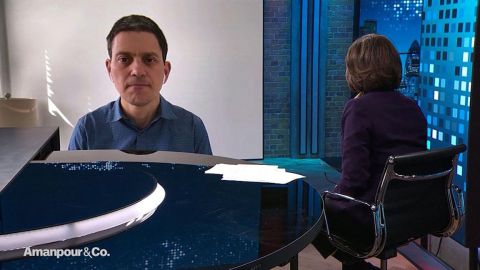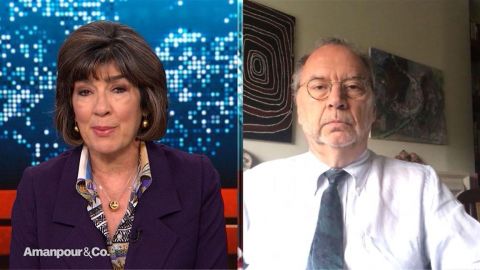Read Transcript EXPAND
DAVID MILIBAND, FORMER BRITISH FOREIGN SECRETARY: However, my professional thoughts have to be with the 13,000 staff members and 25,000 auxiliary workers that the International Rescue Committee has all around the world in about 35 to 40 war-torn countries or countries hosting refugees. And, there, the message is simple. Yes, I’m sure it’s bad in those countries with a health system, but imagine what it’s like when there isn’t a health system for the people that we’re trying to help. And so we are trying to mobilize our own resources and other resources to do the basic things that are so important to keep people safe. Fortunately, infection prevention and control is an area in which the International Rescue Committee has a lot of expertise, partly born out of the Ebola experience. And so we’re putting that to good effect all around the world.
CHRISTIANE AMANPOUR: We’re just going to put up a map to show where the biggest concentrations of refugees are right now, the most vulnerable. And, essentially, we have got Syria, where there’s some 6.7 million refugees, Afghanistan 2.7 million, South Sudan 2.3 million, Myanmar 1.1 million, and Somalia 0.9 million refugees. This is a lot. That’s a total of about 14, people in camps, essentially. Have you any evidence, any data suggesting that any of these people have been affected? I mean, can you even measure what’s going on there?
MILIBAND: Well, yes, we can measure, and we can follow. The great gift for those countries you mentioned is time. They haven’t yet been stricken by the virus in the kind of way that you have been describing in some European countries and is happening in American cities. And our message is very simple. We have got to use that gift of time to good effect. We have got to use it to take the preemptive measures that are necessary, the handwashing that we’re doing in all of our sites in Afghanistan, the work in Northeast Syria that we are doing with medical staff to protect medical staff, the work in Colombia that we’re doing to tackle disinformation, the work in Thailand as well to triage potential patients and make sure that temperatures are taken and that people are put somewhere safe if they are showing fever or other signs of the disease. What we know is, the numbers are still very small in the places that you mentioned. But it’s a matter of when, not if, it reaches those places. We saw yesterday that Lebanon recorded 99 cases, for example. The Democratic Republic of Congo had its first cases last week. And I was on the phone today to a staff member in one of the countries that you mentioned, South Sudan. And there, preventative measures are being started. And that’s all to the good, because, when this disease hits these countries, it’s going to hit them very hard, indeed.
About This Episode EXPAND
Dr. Peter Piot, one of the scientists spearheading efforts to combat COVID-19, shares his knowledge of the virus. Symone Sanders explains how the pandemic is affecting Vice President Joe Biden’s presidential campaign. David Miliband, CEO of the International Rescue Committee, discusses how COVID-19 will affect the world’s refugees.
LEARN MORE


